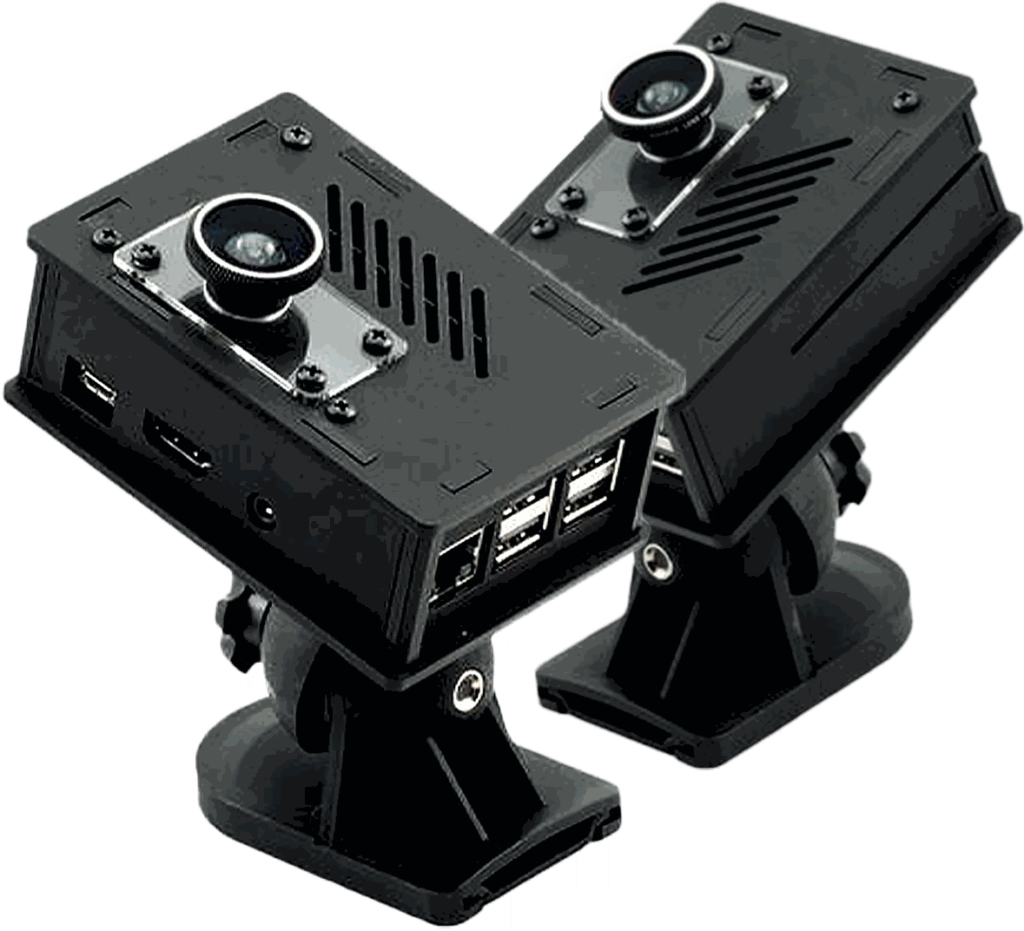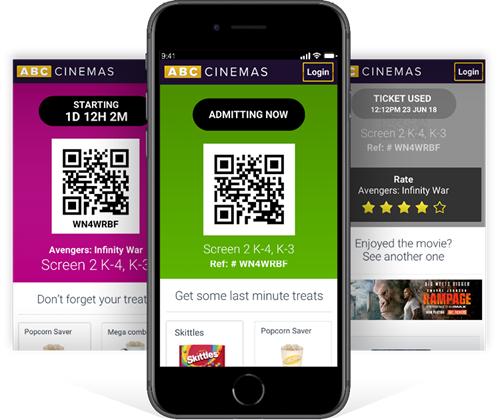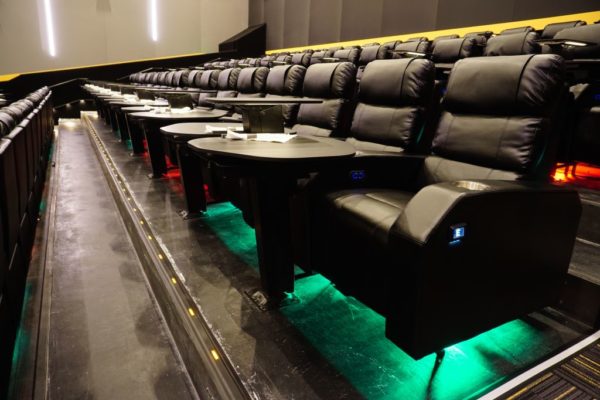Since the COVID-19 pandemic took hold in March, several companies that primarily produced projectors, screens, audio equipment, seating, or other technologies for cinemas have broadened into products aimed to help theaters reopen once permitted by local authorities.
Temperature scanners have been spotted across office buildings and retail businesses around the world as commerce begins to recover. Miami-based cinema technology company CES+, which usually specializes in products like content management systems, began offering the Heatzen Thermal Camera to cinemas in late June. The company claims the camera is accurate to within half a degree Fahrenheit; a thermal imaging system sends an alert to theater staff and employees if a potential patron is discovered to have an elevated temperature.
“The cheapest [thermal imaging] camera we saw was about $2,000,” CES+ Director of Sales Daniela Figueroa said in an interview, discussing the device’s origins. “How am I going to afford this, if I’m an exhibitor? I’m going to need at least two per entrance.”
The company’s alternative is sold in tiered pricing, with one to four units at $699 per camera, five to nine units at $649 per camera, and 10+ units at $599 per camera. “The first day we started was April 14,” Figueroa said, “so in two months we created a product from scratch, both hardware and software.”

While thermal scanners aren’t part of the plan for every cinema, social distancing will be a shared reality for the foreseeable future. New Zealand’s Vista Cinema, a leading provider for cinema software and point-of-sales systems, released their own multi-feature cinema reopening kit in May to assist clients as they prepare to resume operations.
“Based on our history, we usually plan months or even years in advance. In that context, this was very quick,” said Vista Entertainment Solutions CEO Leon Newnham. “We went from saying ‘It looks like this might be a serious issue’ in early March, to all theaters closed by mid-March. By the beginning of April, we released the reopening kit. So within one month, it might be a thing, then it was a thing, then we had readjusted our entire roadmap for our entire company.” The reopening kit’s license is free of charge through Halloween.
Among the biggest innovations Vista expects to thrive in the Covid-era are mobile concessions pre-orders, which would allow moviegoers to choose and pick up snacks without direct face-to-face interaction.
“This is what I think is going to stick: no one wants to queue anyway!,” said Newnham said in an interview. “Cinemas need concessions in order to survive. They need that not to be a problem. People would choose to have or not to have concessions because of how long the line was, even before Covid-19.”
Pre-ordering concessions is expected to be a major feature for cinemas’ own websites and mobile apps in the return, according to The Boxoffice Company president Stan Ruszkowski. “We’ve seen a big uptick from our website clients asking for digital integration with their Food & Beverage business. We’ve already launched this with some clients in France, the U.S., and U.K. and plan to have it available for all our online ticketing clients in the coming weeks,” he said. [The Boxoffice Company is the parent company of Boxoffice Pro].
Inside the auditorium, Ruszkowski said digital ticketing solutions and reserved seating have also been on the rise in order to accommodate restricted capacity and social distancing guidelines. Third-party ticketing aggregators like Atom Tickets and Fandango have been preparing for this for months, leaving exhibitors’ own digital channels open for similar innovations. Vista’s new “living tickets,” for example, update live in real time on your device, like digital airline tickets, if a showtime changes or an auditorium alters its allocated seats––and allows self-scanning for entrance, too.

To support the increased need for online presence, The Boxoffice Company developed a new content management system for exhibitors to launch their websites––completely self-serve, with automated data population for films and showtimes. “This solution can help exhibitors anywhere in the world launch their websites in a matter of minutes,” said Ruszkowski.
“With so many changes occurring at a local level during this crisis––from shifting release dates and showtimes, to updated closures and reopening timeframes––it’s important for exhibitors to directly communicate and ease transactions for their customers,” said Ruszkowski.
At the concession stand, Illinois-based C. Cretors and Company released four new products in mid-June. Their mobile floor standing shield, made from 304 stainless steel, allows cinema employees to interact with customers with a pass-through cutout allowing transfer of items including tickets and change. Their three styles of hands-free sanitizing stands, also made of 304 stainless steel, features a copper-plated antimicrobial drip tray to prevent bacterial growth.
“During World War II, we aided the war effort and transitioned to critical defense work. We went from making poppers to manufacturing aircraft oil line fittings, mechanical radio components, and jack floats used on anti-aircraft guns,” Vice President of Sales and Marketing Shelly Olesen told Boxoffice Pro. “We are an engineering-based, 5th generation family-owned company. With the Cretors family at the helm, it was natural for our management team to remain fluid, flexible and shift gears.”
Another concessions vendor, New York-based Golden Link, Inc., recently launched touch-free door openers (which also work on touchscreens), silicone cases for 30 milliliters of sanitizing gel, and a line of themed facemasks, featuring Justice League, Wonder Woman, Batman, and Superman designs. Ten percent of proceeds go to Variety – the Children’s Charity.
“Our biggest challenge at first was getting cinemas to commit to the masks,” said President Jeff Waaland. “We usually do made-to-order. It’s made in China, so customers won’t get it for a good 45+ days. A cinema’s worry is: Is it going to be a fad? But I think people are realizing now that masks are here to stay for the rest of the year.”
Sanitation protocols inside auditoriums have also intensified, inspiring Michigan-based Telescopic Seating Systems to update their Smart Clean Sweep system, originally unveiled in 2015. The new system displays green and red lights (although the colors can be changed), indicating which seats have been cleaned and which haven’t, as well as UVC lights which damage bacteria and viruses.
“On an average day, you don’t get 100 percent attendance at the cinema, so why are you opening all the chairs? You can only clean the chairs that need to be cleaned,” Managing Director Fred Jacobs said.
The company also introduced a new kind of partition made of fiber wick, completely recyclable and with an antimicrobial finish. When patrons come into the theater, they pick it up and drop it into the holder on the side of their chair. They can also be visually customized depending on the film, allowing for a potential collectible item. “If it’s Mulan, if you want to take it with you afterwards, you can,” Jacobs said.
To ensure an efficient cleaning schedule, Florida-based CIELO unveiled CIELO QR to streamline the sanitation and cleaning processes with less person-to-person contact.
A cinema’s cleaning schedule has usually been done manually, with a manager checking off a box on a physical piece of paper when a specific area is done. CIELO QR allows the division of a venue into up to 10 zones, with each zone getting a custom QR code printed on a sign to hang on the wall. Codes are scanned once the area is cleaned. This way, the status of all zones can be checked digitally. Patrons themselves can scan the QR code to alert cinema staff, who might not be physically proximate due to social distancing, of any potential problems.
“This [pandemic] happens, and we said, ‘Look, we think we have a very good solution for exhibitors right now. Because everybody’s now concerned about safety, cleanliness, disinfection,” Vice President of Customer Growth Rafael Garzon said in a May interview with Boxoffice PRO. “What we developed wasn’t intended for the virus. But I think it’s very good [for] this time.”



Share this post